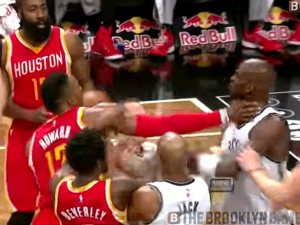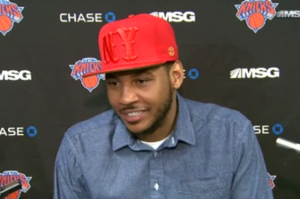 Does an open-handed shove qualify as a punch?
Does an open-handed shove qualify as a punch?
In what could set an important standard for future player altercations, the NBA league office seems to be saying that it does not.
You’ve likely all seen the story. In the first quarter of Monday night’s game in Brooklyn between the Rockets and Nets, Kevin Garnett and Dwight Howard got into a bit of a scuffle. It started with a pair of minor slaps after a foul by Garnett and escalated when Garnett virtually lost his mind, throwing the basketball at Howard and headbutting him.
 From there, Howard responded with either a punch, shove or slap (depending on your vantage point) and the two were separated — though it didn’t stop an enraged Garnett from attempting one last rush at Howard after he pretended to calm down. The in-game officials looked at video of the incident and decided that Howard’s response did not qualify as a punch, thus prompting them to eject only Garnett while letting Howard stay.
From there, Howard responded with either a punch, shove or slap (depending on your vantage point) and the two were separated — though it didn’t stop an enraged Garnett from attempting one last rush at Howard after he pretended to calm down. The in-game officials looked at video of the incident and decided that Howard’s response did not qualify as a punch, thus prompting them to eject only Garnett while letting Howard stay.
Neither player commented on the incident when asked by reporters following the game.
The league office weighed in Tuesday and came to the same conclusion as the game’s officials, suspending Garnett one game without pay for “initiating an altercation” and headbutting. Howard, meanwhile, was only fined $15,000 for “pushing Garnett in the neck area” and will not be suspended, according to Rod Thorn, the NBA’s president of basketball operations.
On the surface, it seems like a fair result. Garnett undoubtedly initiated the sequence and was clearly the aggressor, and given that physical attack, it seems appropriate to give Howard some latitude to defend himself. If Howard intended to escalate the matter and punch Garnett, he had every opportunity. There’s a reason Howard’s hand remained open, rather than cocked in a punching position.
Nonetheless, the NBA has typically erred on the side of heavy discipline when it comes to player altercations. For example, players who leave the bench area during an incident are automatically suspended — even if they’re attempting to act as peacemakers.
On Monday, even Houston’s broadcast team of Bill Worrell and Matt Bullard assumed during the initial review that Howard would be ejected. They called it “fair” when Howard remained in, and it probably was, but it did seem somewhat uncharacteristic in the context of the NBA’s disciplinary history.
In the interim, the Nets (16-22) will be without Garnett when they host Memphis on Wednesday night, while the Rockets (27-11) will have Howard when they play in Orlando that same evening. The Nets have lost six consecutive games, while the Rockets have won four straight, and it looks like those streaks could continue further in the aftermath of the disciplinary decisions.
But Tuesday’s decision by Thorn and the league office could have broader implications beyond just those two franchises. Is the NBA open to giving additional latitude in altercations to players acting in self-defense? Monday’s incident would appear to be a small step in that direction.
OTHER NEWS FROM AROUND THE NBA
 The Knicks are 5-35 and losers of 15 straight, numbers that make them undoubtedly the league’s worst team. Considering the roster, it’s not exactly a shock.
The Knicks are 5-35 and losers of 15 straight, numbers that make them undoubtedly the league’s worst team. Considering the roster, it’s not exactly a shock.
Nonetheless, the combination of more money and Phil Jackson’s long-term plan was enough to convince Carmelo Anthony to choose the Knicks as a free agent this past summer. And despite the incredible struggles of the team on the floor, Anthony thinks future free agents won’t be scared off, either.
Carmelo doesn’t think #Knicks‘ record will scare away FAs: “I think I’m a good salesman. But we’ll see what happens when that time comes.”
— Ian Begley (@IanBegley) January 12, 2015
With Amar’e Stoudemire’s contract expiring after this season and J.R. Smith’s deal now off the books (to Cleveland), the Knicks could be poised to have as much as $30 million in cap room this offseason. The issue is whether top-shelf free agents with considerable options would consider New York as a viable landing spot, given their immense problems these days.
Someone would take the Knicks’ money, of course. But will Anthony, Jackson and the Knicks be able to lure truly elite talent, or will they end up paying a premium just to attract good-but-not-great players? Remember, that’s what led to Detroit spending $54 million on Josh Smith back in July 2013.
Anthony, guaranteed over $100 million over the next four seasons, seems to have confidence in himself as a salesman to overcome those obstacles. For New York’s sake, he better be right.
 Russian billionaire Mikhail Prokhorov has retained Evercore Partners to help him sell the Brooklyn Nets, reports Scott Soshnick of Bloomberg, citing two sources with direct knowledge of the matter.
Russian billionaire Mikhail Prokhorov has retained Evercore Partners to help him sell the Brooklyn Nets, reports Scott Soshnick of Bloomberg, citing two sources with direct knowledge of the matter.
“As we have been saying for many months, team ownership is open to listening to offers,” said Ellen Pinchuk, Prokhorov’s spokeswoman. “That’s just part of the business. There’s nothing imminent in terms of the sale of any stake in the team.”
Prokhorov, 49, is the first foreign owner of an NBA team. He holds an 80% stake in the Nets and a 45% stake in the Barclays Center arena. Only the team is for sale, according to the Bloomberg report.
Quoting a source, Soshnick reports that because of Brooklyn’s home in the No. 1 US media market and the infrequency of which marquee franchises become available, the Nets could fetch even more than the record $2 billion that Steve Ballmer paid for the Clippers over the summer.
Valuations expert Peter Schwartz estimates the Nets’ actual value at roughly $1.3 billion.
Assuming the report is true, the Nets now join the Atlanta Hawks as two franchises on the market for new ownership. The Nets have the highest payroll in the league ($91 million) and are only 16-22, while the efficient Hawks possess the Eastern Conference’s best record at 29-8.
Ben DuBose is a veteran sports reporter who has followed the Houston Rockets and the NBA since Hakeem Olajuwon was Akeem Olajuwon. He writes for both SheridanHoops and ClutchFans, an independent Rockets blog. You can follow him on Twitter.